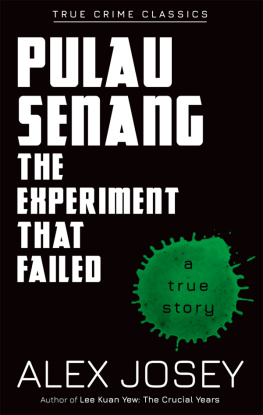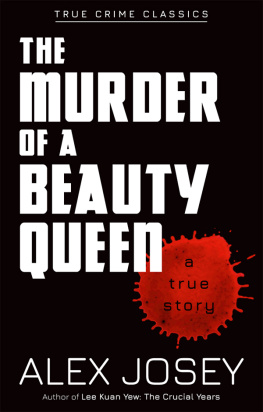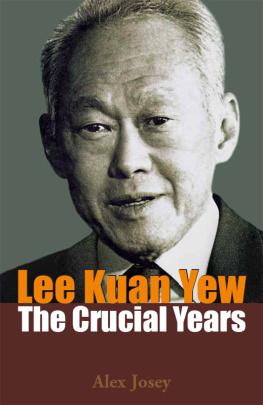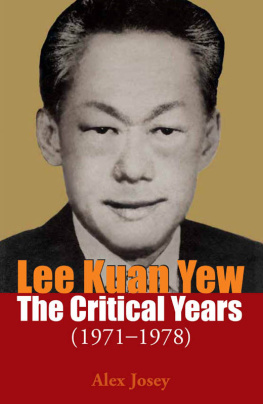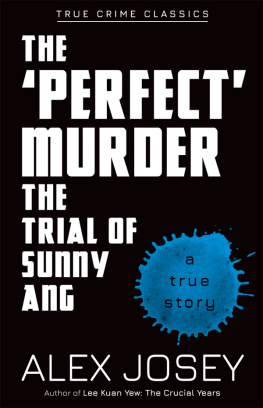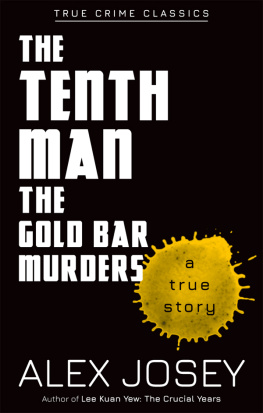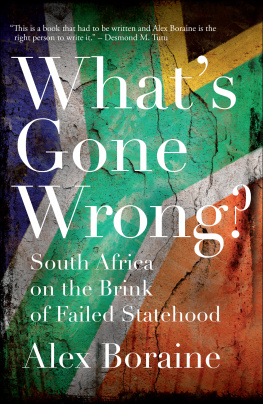Alex Josey - Pulau Senang: The Experiment that Failed
Here you can read online Alex Josey - Pulau Senang: The Experiment that Failed full text of the book (entire story) in english for free. Download pdf and epub, get meaning, cover and reviews about this ebook. publisher: Marshall Cavendish International, genre: History. Description of the work, (preface) as well as reviews are available. Best literature library LitArk.com created for fans of good reading and offers a wide selection of genres:
Romance novel
Science fiction
Adventure
Detective
Science
History
Home and family
Prose
Art
Politics
Computer
Non-fiction
Religion
Business
Children
Humor
Choose a favorite category and find really read worthwhile books. Enjoy immersion in the world of imagination, feel the emotions of the characters or learn something new for yourself, make an fascinating discovery.
- Book:Pulau Senang: The Experiment that Failed
- Author:
- Publisher:Marshall Cavendish International
- Genre:
- Rating:5 / 5
- Favourites:Add to favourites
- Your mark:
- 100
- 1
- 2
- 3
- 4
- 5
Pulau Senang: The Experiment that Failed: summary, description and annotation
We offer to read an annotation, description, summary or preface (depends on what the author of the book "Pulau Senang: The Experiment that Failed" wrote himself). If you haven't found the necessary information about the book — write in the comments, we will try to find it.
Pulau Senang: The Experiment that Failed — read online for free the complete book (whole text) full work
Below is the text of the book, divided by pages. System saving the place of the last page read, allows you to conveniently read the book "Pulau Senang: The Experiment that Failed" online for free, without having to search again every time where you left off. Put a bookmark, and you can go to the page where you finished reading at any time.
Font size:
Interval:
Bookmark:


2020 Marshall Cavendish International (Asia) Private Limited
First published in 1980 by Times Books International
Published by Marshall Cavendish Editions
An imprint of Marshall Cavendish International

All rights reserved
No part of this publication may be reproduced, stored in a retrieval system or transmitted, in any form or by any means, electronic, mechanical, photocopying, recording or otherwise, without the prior permission of the copyright owner. Requests for permission should be addressed to the Publisher, Marshall Cavendish International (Asia) Private Limited, 1 New Industrial Road, Singapore 536196.
Tel: (65) 6213 9300 E-mail:
Website: www.marshallcavendish.com/genref
The publisher makes no representation or warranties with respect to the contents of this book, and specifically disclaims any implied warranties or merchantability or fitness for any particular purpose, and shall in no event be liable for any loss of profit or any other commercial damage, including but not limited to special, incidental, consequential, or other damages.
Other Marshall Cavendish Offices:
Marshall Cavendish Corporation, 800 Westchester Ave, Suite N-641, Rye Brook, NY 10573, USA Marshall Cavendish International (Thailand) Co Ltd, 253 Asoke, 16th Floor, Sukhumvit 21 Road, Klongtoey Nua, Wattana, Bangkok 10110, Thailand Marshall Cavendish (Malaysia) Sdn Bhd, Times Subang, Lot 46, Subang Hi-Tech Industrial Park, Batu Tiga, 40000 Shah Alam, Selangor Darul Ehsan, Malaysia
Marshall Cavendish is a registered trademark of Times Publishing Limited
National Library Board, Singapore Cataloguing-in-Publication Data
Name(s): Josey, Alex.
Title: Pulau Senang : the experiment that failed / Alex Josey.
Description: Singapore : Marshall Cavendish Editions, [2020] | First published in 1980 by Times Books International and subsequently compiled under Cold blooded murders in 2009 by Marshall Cavendish Editions.
Identifier(s): OCN 1150779364 | e-ISBN 978 981 4893 58 9
Subject(s): LCSH: Dutton, Daniel. | Trials (Murder)--Singapore. | Prison riots--Singapore. | Criminals--Rehabilitation--Singapore. | Senang Island (Singapore)
Classification: DDC 345.595702523--dc23
Printed in Singapore

It happened in the 1960s in the newly self-governing state of Singapore, a small tropical island of some two million people. Having thrown off the shackles of British colonialism, the democratic nationalists confronted the communists and narrowly defeated them in a bloodless battle. Almost at once, the new government had to face a serious secret society menace. Hundreds of gangsters were arrested and thrown into jail without trial. Hopefully believing that most men could change their way of life if given a chance, the Government bravely experimented with a scheme to rehabilitate these gangsters, all of whom had sworn oaths of loyalty to their secret societies. The idea was to make an islet off the main island a prison without bars, to be supervised by Daniel Dutton, a God-fearing, fist-swinging, wild Irishman devoutly dedicated to the belief that mans inherent evil could be exorcised by hard work. Under his active direction, the gangsters created an island paradise. But they soon turned on Dutton and murdered him and his assistants, and in less than an hour, savagely destroyed all they had sweated so long to build. Why? The question has never been satisfactorily answered.
In a massive trial before an Australian-born judge and a seven-men jury, more than 60 gangsters were charged with rioting and murder. Never before in Asia, or since, has there been such a trial. Eighteen criminals, most of them in their 20s, were found guilty and hanged.
Many decades later, remnants of secret societies still exist, but Singapore has become a state where law and order is firmly established. The Government practises its own form of socialism which works well. Free enterprise is encouraged. The State subsidises healthcare, education and housing. Drug addicts are patiently helped, so are selected secret society gangsters. But the bold experiment that failed was never repeated. Once was enough.
This is the true story of an idealistic belief, translated into actuality for a short while in the early 1960s, that violent, lawless men could find their own way back to decent society were they given a proper chance to work and create. The argument was that these men had drifted into crime because theyd never had an opportunity to know disciplined creative work.
Hundreds of them in Singapore were given this chance in 1960. Inside a few months, hitherto work-shy gangsters (hardened criminals most of them, unproven murderers, extortioners, callous robbers, psychopaths, rapists), transformed a deserted tropical island into an attractive, busy settlement with roads and water supply, huts, workshops, canteen, dormitories, laundry, community hall. Practically all the criminals were members of secret societies. Having built a comfortable settlement with their own hands, within 40 minutes one sunny afternoon, they deliberately destroyed it and murdered the man largely responsible for making the scheme possible. With him died three of his assistants.
The island was called Pulau Senang. In the Malay language this means the island of ease. As a rehabilitation settlement, it was a noble experiment that failed. Why? Why did the gangsters destroy it, having toiled and sweated in the tropical sun to build it? No completely satisfactory explanation has been forthcoming. One belief is that the leading secret-society chief on the island ordered the destruction of the settlement to prove that he was more powerful than the Government. During the trial of this man, Tan Kheng Ann, alias Robert, alias Robert Black alias Ang Chuar (and 58 others), witnesses said that the decision to kill the man in charge, 39-year-old Prison Officer Daniel Stanley Dutton, was because Dutton had tormented them beyond endurance. Breaking point had been reached when he ordered 13 carpenters to work overtime to complete the construction of a pier which could be worked on only during certain tides. When the carpenters refused, Dutton ordered them back to Changi Prison, thus blighting their hopes for rehabilitation. Witnesses said this decision inflamed the rest of the men and triggered off the revolt. Another belief is that the secret-society chief had tormented the opposition to Dutton and had been waiting for just such an opportunity before giving the order to attack and burn the settlement to the ground.
Pulau Senang Rehabilitation Settlement originated in the mind of a political prisoner of the British. Though he admitted that he was well-treated himself in detention as a pro-communist subscribing to the violent overthrow of colonialism, Devan Nair was horrified at the conditions in the prisons for convicted criminals, and for criminal suspects detained indefinitely without trial. He was determined one day to do something about this.
Font size:
Interval:
Bookmark:
Similar books «Pulau Senang: The Experiment that Failed»
Look at similar books to Pulau Senang: The Experiment that Failed. We have selected literature similar in name and meaning in the hope of providing readers with more options to find new, interesting, not yet read works.
Discussion, reviews of the book Pulau Senang: The Experiment that Failed and just readers' own opinions. Leave your comments, write what you think about the work, its meaning or the main characters. Specify what exactly you liked and what you didn't like, and why you think so.

